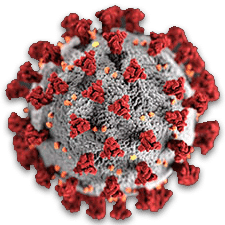In 2008, Julia Farries, a pharmaceutical sales representative, realized she could no longer lug her wares between the various hospitals where she saw clients. Her joints felt like they were “on fire,” she said. Within months, the pain stopped her from doing other things, too: pruning her plants, feeding her chickens, carrying her purse, clapping in applause. “That’s when people began to see me as ‘Sick Julia,’” she said.
Over the next eight years, Farries, now 55, sought treatment for what her doctors presumed to be lupus, an autoimmune disease. But her condition continued to deteriorate. Three surgeries later, she was diagnosed with a different autoimmune condition called psoriatic arthritis. Her doctor prescribed her a drug that suppresses the immune system; on it, she could bake, walk, and empty at least the top rack of the dishwasher. “It gave me back some of what I’d lost,” she said.
But Farries’ luck turned again in January of this year, when Covid-19 hit. After speaking with her doctor, who counseled her that immunosuppressive drugs would heighten her risk of falling ill to the new disease, she discontinued the medicine. Within weeks, her joints “exploded,” she said. “Every morning became its own living hell.”
Farries is not alone. As Covid-19 emerged on the global scene last winter, the prevailing wisdom in the medical community was that immune system-weakening drugs would diminish the body’s ability to stave off the disease. As a result, some 24 million Americans with autoimmune diseases — and hundreds of millions of others across the globe — faced what seemed to be a no-win proposition: continue their treatment and put themselves at the mercy of the new coronavirus, or stop their medications and suffer through agonizing flare-ups.
Months later, however, emerging research indicates that this may have been a false choice. Studies of hundreds of Covid-19 cases around the world suggest that patients on immune modifying drugs do not show increased vulnerability to the disease; in some cases, they actually seem to fare better.
This kind of about-face is not unusual. In science, old hypotheses are continuously stressed, strained, disproven, and replaced by new ones; the wheel of scientific literature is constantly turning. The challenge — particularly in this era of preprints and press releases, when science whirs forward at an unprecedented pace — lies in deciding how and when to translate that literature into practice. In the case of Covid-19, despite growing evidence that immunosuppressives do not increase Covid-19 risks, some medical bodies, including the U.S. Centers for Disease Control and Prevention, have been hesitant to update their messaging.
As a medical student and a graduate student in health policy, I’ve seen this fundamental tension play out again and again within the medical community. Clinical medicine has long prioritized rigor over adaptability, certitude over speed — and for good reason. But in the face of a pandemic that is unfolding at a blistering pace, one can’t help but wonder: Might there be a middle path?
In the early days of the outbreak, Joan Bathon, like many physicians, scrambled to discover how to do best by her patients. Bathon, a rheumatologist at New York City’s Columbia University Irving Medical Center, is responsible for the care of hundreds of individuals with disabling and potentially deadly autoimmune diseases and related conditions, including gout, rheumatoid arthritis, and ankylosing spondylitis. The immunosuppressives she prescribes to tamp down damaging inflammation caused by these diseases are potent, and have an important side effect: They can leave patients susceptible to severe infections.
During the pandemic, Bathon strove to balance the known benefits of these drugs with the unknown risks of developing a severe form of Covid-19. The CDC, among other public health authorities, was doing the same. The agency took a conservative approach: They advised, based on the prevailing wisdom related to other infectious diseases, that individuals with “immunocompromised states” were at increased risk for severe Covid-19. The U.K.’s health ministry similarly urged such patients to self-isolate indefinitely, as part of the country’s strategy to radically “shield” vulnerable groups from unnecessary exposure to the virus. Other governing bodies across the globe followed suit.
Reacting to this guidance, physicians across the world began prescribing fewer immune-modifying medications, experts say. Some patients took it upon themselves to discontinue their medications after hearing that it would make them vulnerable to Covid-19. One of Bathon’s patients, a jeweler with psoriatic arthritis named Jeff Tamis, says he ceased taking the drugs after lunch in New York City with a Nobel Laureate who called him “nuts” for continuing the medicines. But within a couple weeks, in early May, Tamis developed foot pain that he knew presaged a flare-up. To avoid potentially debilitating consequences, he restarted his drug regimen.
Around that time, surprising observations about Covid-19 and immunosuppressives began to emerge. As the Bergamo region of Italy was being decimated by the virus in early spring, scientists there noticed that patients on immunosuppressive medicines were not getting sick at the sky-high rates they had feared, nor were they having particularly poor outcomes if they did get sick. Paradoxically, the research suggested that in some cases the patients were actually faring better than counterparts who weren’t on the drugs.
By late May, additional data began to pour in. A robust international study of 600 cases across dozens of countries found that treatment with immune weakening drugs was not associated with worse outcomes, and that patients on certain, targeted immunosuppressives had improved outcomes. (Steroids were a notable exception; they impact the immune system more broadly and produced adverse outcomes among Covid-19 patients in all but a few specific circumstances.) Subsequent studies evaluating hundreds of patients with inflammatory bowel disease, multiple sclerosis, and other autoimmune diseases similarly demonstrated that targeted immunosuppressives didn’t worsen Covid-19 risks.
Although it was contrary to the conventional wisdom, the body of work fit with a growing recognition that severe Covid-19 is linked to excessive, rather than insufficient, immune activity — particularly in the branch of the immune system that’s responsible for regulating the inflammatory response. The association of severe disease with an overzealous, inflammatory immune response also matched observations made during the SARS and MERS coronavirus outbreaks. It stood to reason, then, that medicines constraining this branch, as targeted immunosuppressives do, shouldn’t necessarily worsen Covid-19 risk. In fact, many of them — tocilizumab, infliximab, canakinumab, olokizumab, mavrilimumab, anakinra — are actively being investigated as potential treatments for Covid-19.
The idea that patients on immunosuppressives would have lower or equal risk was “definitely counterintuitive at first,” said Philip Robinson, a rheumatologist at the University of Queensland in Australia and leader of an international Covid-19 collaborative. “But every day now, more data supports that hypothesis.”
 |
For all of Undark’s coverage of the global Covid-19 pandemic, please visit our extensive coronavirus archive. |
Specialists in treating autoimmune diseases responded swiftly to this new evidence. In July, the American College of Rheumatology, the European League Against Rheumatism, and the British Society for Rheumatology updated their guidelines, advising that, in most cases, patients on immune-modifying medications should continue taking them during the pandemic. But other institutions, including the CDC, were more timid. Although the CDC did tweak its guidance in June, it maintains that, while patients taking immune weakening medicines should continue their course of treatment and talk with their health care provider, they still “might be at an increased risk for severe illness from the virus that causes Covid-19.”
This dissonance between guidelines as they have changed and evolved has had real repercussions on the decisions of doctors and patients. It has led patients to prematurely discontinue their immunosuppressive medications, or even avoid the clinic altogether. For patients whose autoimmune diseases leave them susceptible to rapid deterioration, these decisions have been debilitating.
Farries, the pharmaceutical sales representative, knows this all too well. After going months without her psoriatic arthritis medication, her condition deteriorated to the point where, despite ever-increasing levels of opioid pain treatments, she was unable to lift herself out of bed, causing her to soil herself during the night. Eventually, in June, she went back on her immunosuppressives. She was relieved to hear from Robinson, who is now her rheumatologist, about the new data showing that the drugs may not put her at higher risk after all. She said she still feels fragile, but she’s optimistic.
Patients like Farries exemplify the price we pay in exchange for rigor and certainty in clinical practice. But somewhere in the space between certainty and conjecture, between peer review and public relations, may lie a more nimble way to translate scientific literature into practice during tumultuous times like these. For our patients to survive and thrive — especially in times of crisis and uncertainty — we in the medical community must seek that middle path.
Eli Cahan is a master’s student in health policy at Stanford University as a Knight-Hennessy Scholar and a medical student at NYU School of Medicine.
Update: A previous version of this piece characterized gout as an autoimmune disease. Rather, it is part of a related category called autoinflammatory diseases.











